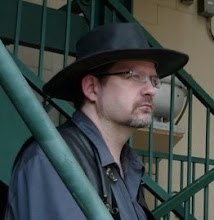DDXP and DnD Next
So I am finally expanding on my thoughts in regards to the D&D Experience (DDXP) and the new edition of D&D in the works, also known to almost everyone except WotC as 5E, to WotC as D&D Next (DDN). My guess is that WotC is avoiding the term 5E or 5th Edition to try to avoid the stigma of the edition wars. I can't say as I blame them, as long as they don't pretend that the fallout in the D&D community is one of the big reasons they have to dump 4E.
There has already been a lot of info in the gaming blogosphere about DDN and the info from DDXP. Like everyone else, I signed a NDA, so I won't be disclosing any crunch that wasn't talked about in the seminars, which were NDA free.
First of all, my impression from the playtest was very favorable. It felt a lot more like playing old-fashioned D&D as opposed to spending 3 hours trying to get through a tabletop approximation of a couple of WoW instances. We were able to get through several fights and our characters were in genuine peril. As a player, I would enjoy playing this system. As a GM, I could run it.
Any of my players reading this are thinking "sure, you could run it after you tamper with it, like every other game you run." That's one of the things that interests me about DDN, the intended modular rule design. It will be premade so that I can take rules systems I like and plug them into the framework. Yes, I'll probably make some modules of my own, especially since we don't know how many modules will be out at launch. My guess is enough to play the game, not they will hold some stuff back to make more books we'll want to buy.
One of the statements that caught my interest during the seminar was that they intended to include every class that has appeared in a Players Handbook, or the PHB1 in the case of 4E. That's a lot of classes. My first question was "do we need something like 20 classes?"
What really is the difference between wizards, sorcerors, warlocks and illusionists? Aren't warlords really just fighters with some leadership ability? Assassins are rogues that are more stabby and less thiefy. Barbarians are tough fighters (or rangers) with anger management issues. It seems like these could be handled with themes and class ability options.
I think the basic classes should be iconic. If you go to D&D players and say fighter, rogue, druid, wizard, they'll have a solid mental icon. Try sorceror, illusionist, and warlock and they'll probably look like the wizard. Say warlord and you'll get a blank look or a fighter. While I'm sure the designer are reluctant to let go of their 4E creations (and warlocks were actually my favorite class out of the 4E PHB1), the class list should be pared down.
I don't remember races being discussed, but my opinion is along the same lines. They should have the basic races and save the races created or added to the core rules in 4E (dragonborn, eladrin, and tiefling) for an advanced race option module.
I couple of other things in the seminar that I think hit the mark was their intended approach towards multi-classing and magic items. Multi-classing will probably work a lot like it did in 3rd edition, while magic items go back to being treasure and having some mystery to them as opposed to progression you can buy in a store.
So far I'm not in the playtest... and I guess even if I was it wouldn't matter as I couldn't talk about anything in it. But I'm keeping a hopeful mind regarding DDN and will buy the first round of books. Maybe WotC will turn me back into a game buyer as opposed to someone who peruses the internet looking for ingredients for his homebrew d20.
Read the rest!
There has already been a lot of info in the gaming blogosphere about DDN and the info from DDXP. Like everyone else, I signed a NDA, so I won't be disclosing any crunch that wasn't talked about in the seminars, which were NDA free.
First of all, my impression from the playtest was very favorable. It felt a lot more like playing old-fashioned D&D as opposed to spending 3 hours trying to get through a tabletop approximation of a couple of WoW instances. We were able to get through several fights and our characters were in genuine peril. As a player, I would enjoy playing this system. As a GM, I could run it.
Any of my players reading this are thinking "sure, you could run it after you tamper with it, like every other game you run." That's one of the things that interests me about DDN, the intended modular rule design. It will be premade so that I can take rules systems I like and plug them into the framework. Yes, I'll probably make some modules of my own, especially since we don't know how many modules will be out at launch. My guess is enough to play the game, not they will hold some stuff back to make more books we'll want to buy.
One of the statements that caught my interest during the seminar was that they intended to include every class that has appeared in a Players Handbook, or the PHB1 in the case of 4E. That's a lot of classes. My first question was "do we need something like 20 classes?"
What really is the difference between wizards, sorcerors, warlocks and illusionists? Aren't warlords really just fighters with some leadership ability? Assassins are rogues that are more stabby and less thiefy. Barbarians are tough fighters (or rangers) with anger management issues. It seems like these could be handled with themes and class ability options.
I think the basic classes should be iconic. If you go to D&D players and say fighter, rogue, druid, wizard, they'll have a solid mental icon. Try sorceror, illusionist, and warlock and they'll probably look like the wizard. Say warlord and you'll get a blank look or a fighter. While I'm sure the designer are reluctant to let go of their 4E creations (and warlocks were actually my favorite class out of the 4E PHB1), the class list should be pared down.
I don't remember races being discussed, but my opinion is along the same lines. They should have the basic races and save the races created or added to the core rules in 4E (dragonborn, eladrin, and tiefling) for an advanced race option module.
I couple of other things in the seminar that I think hit the mark was their intended approach towards multi-classing and magic items. Multi-classing will probably work a lot like it did in 3rd edition, while magic items go back to being treasure and having some mystery to them as opposed to progression you can buy in a store.
So far I'm not in the playtest... and I guess even if I was it wouldn't matter as I couldn't talk about anything in it. But I'm keeping a hopeful mind regarding DDN and will buy the first round of books. Maybe WotC will turn me back into a game buyer as opposed to someone who peruses the internet looking for ingredients for his homebrew d20.
Labels: 5E, DnD, DnDNext, games
Read the rest!



